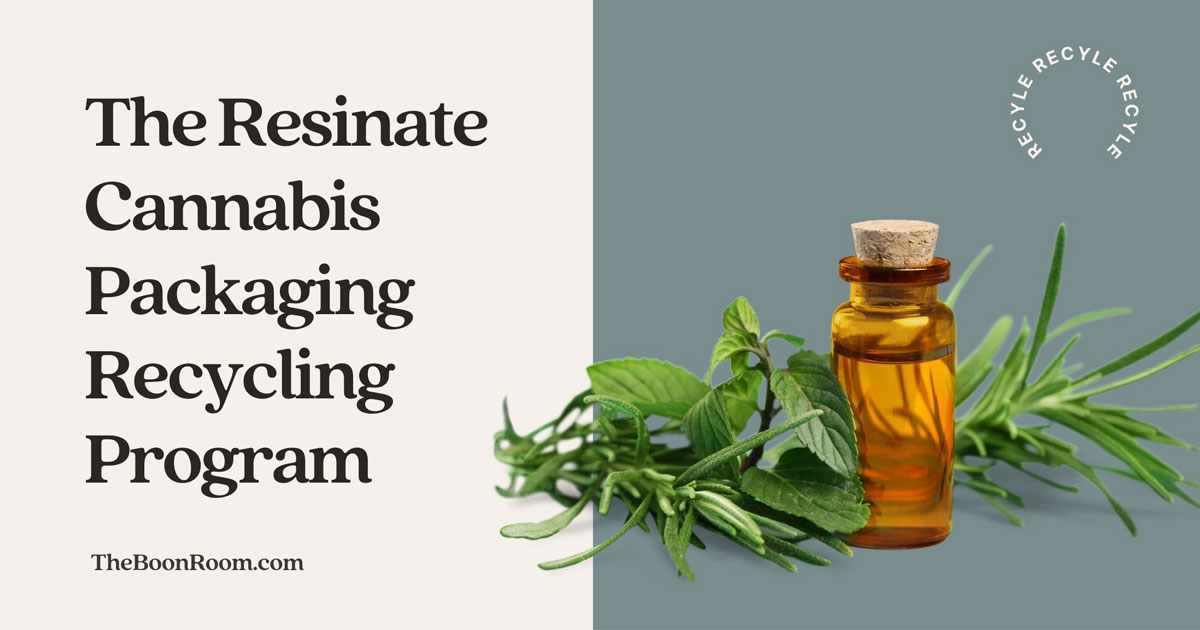
A Better Way to Recycle Cannabis Packaging
Photo from The Boon Room
Originally Posted On: https://theboonroom.com/business-sustainability/resinate-canna-packaging/
Efficient recycling methods can help to reduce the volume of waste that ends up in the earth’s landfills. It can also help to reduce the overall consumption of natural resources, like water and timber, needed to produce more products. In these ways, recycling can protect the environment.
Events in recent years have pushed recycling and its benefits to the forefront of both the government and private sectors. During the 2020 America Recycles Summit, the Environmental Protection Agency announced the nation’s first National Recycling Goal. The goal is to boost the national recycling rate to 50% before 2030 by reducing contamination in recycling. This will make recycling processing systems more efficient and strengthen the market for recycled materials.
Resinate, a company providing solutions to cannabis product packaging recycling, has tapped into this effective movement to change how we recycle and what the future of recycling looks like. The scale of packaging for products is constantly increasing, and so is Resinate.
The company’s commitment to recycling has inspired a complete rebranding of the recycling program to incorporate the new circular economy – the idea that an economy based on the reuse and recycling of sustainable products can help increase production in an environmentally friendly way. Last year, the number of Resinate partnered industry locations increased from seven to 30, more than quadrupling their capabilities.
Suggested Reading: Business Benefits of Recycling
Who Is Resinate?
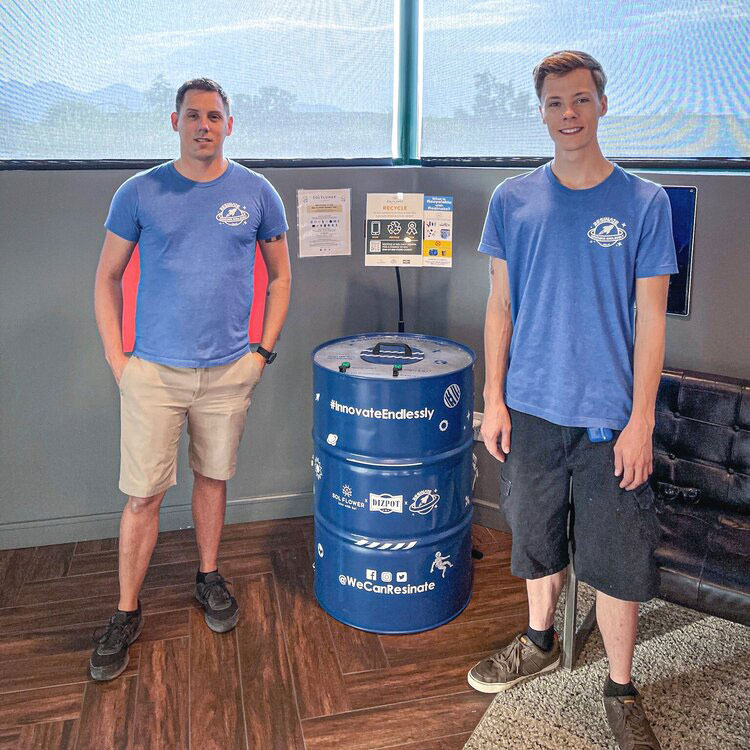 Image Credit: resinate.techResinate is an upcycling company dedicated to building better solutions for rescuing recyclable materials from ecosystems and landfills. It was founded by brothers Garrett Schwartz and Brandon Schwartz in 2018 after they began asking why so little recycling was occurring. This critical question was asked in response to the crumbling of the world’s recycling infrastructure.
Image Credit: resinate.techResinate is an upcycling company dedicated to building better solutions for rescuing recyclable materials from ecosystems and landfills. It was founded by brothers Garrett Schwartz and Brandon Schwartz in 2018 after they began asking why so little recycling was occurring. This critical question was asked in response to the crumbling of the world’s recycling infrastructure.
This event highlighted the major issue of small items literally falling through the cracks of typical recycling systems. Normal recycling systems filter out small packaging items as contaminants, meaning they are not recycled even though they were placed in the correct location for recycling. Resinate’s solution was to pair with local businesses to improve recycling methods by supplying them with the Energy Pod. This specially designed recycling bin was developed to make recycling more accessible and more efficient.
The SlingShot Program
The SlingShot Program is the official term coined for this innovative recycling process. As a part of the program, businesses are supplied with an Energy Pod, an advanced recycling bin that is outfitted with sensors that notify Resinate when it’s full, allowing a hands-off process for the business hosting the pod.
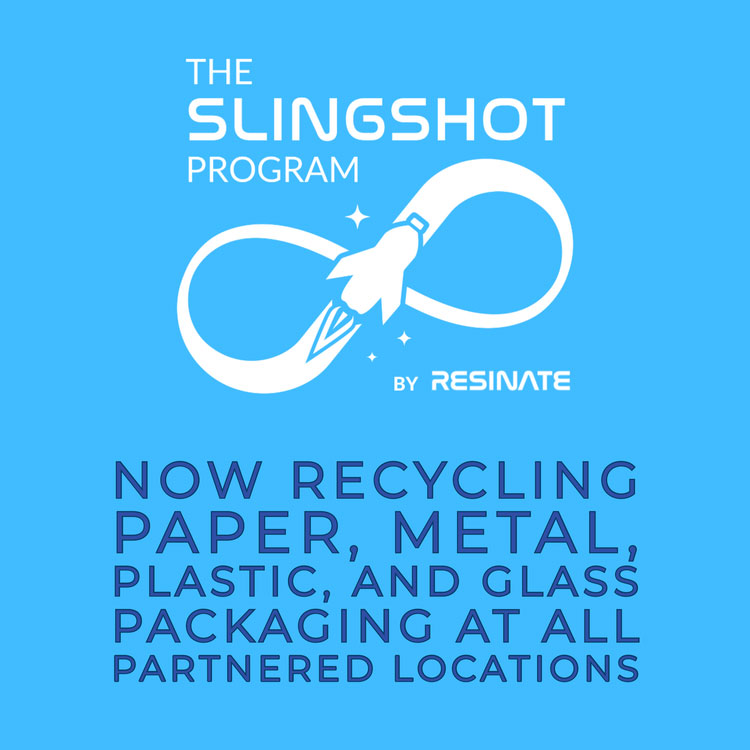
It is not necessary to remove the labels from any recycled packaging and most plastic types like jars, lids, and tubes, as well as paper products, cardboard, metal tins, and metal boxes. As Resinate’s partnerships increase, capabilities are expected to expand to include glass products.
Though there is the environmental benefit of recycling the items into the Energy Pod, Resinate has also created a reward system that further entices individuals and businesses to recycle.
It is a simple three-step process to retrieve rewards:
- Scan the QR code located above the Energy Pod to verify recycling for rewards.
- Recycle items in the Energy Pod by pressing the button and depositing the items.
- Rewards are sent to the user’s email at the beginning of the following month.
The automated systems involved in signage, software, and hardware easily guide people to recycle while earning rewards, creating a system that reduces contamination and maximizes efficiency. This closed-loop recycling system allows people to recycle plastic, cardboard, paper, and metal packaging confidently and safely.
Additionally, The SlingShot Program complies with HIPAA best practices as well as state regulations. Containers feature a locked door and other physical barriers designed to prevent access to recycled items.
Open Loop Versus Closed Loop Recycling
There are two major types of recycling processes: open loop and closed loop.
Open-Loop Recycling
Open-loop recycling involves any recycling process that turns recycled materials into new raw materials and waste products. This typically means that these materials are repurposed for uses distinct from the original purpose of the material. The materials introduced to the recycling operation are altered to become fresh, raw materials that can be used for another manufacturing process.
In open-loop recycling, the materials involved are grouped with similar materials, then altered using chemical reactions, heat, or physical crushing. This method often results in some deterioration of the material as well as the loss of attached elements like adhesives and bottle labels. Open-loop recycling is frequently used in governmental recycling programs.
Closed-Loop Recycling
Closed-loop recycling focuses on the long-term viability of supply chains. Closed loop systems are designed to ensure the materials used to manufacture goods can be continuously recycled because the materials are usually used in the same type of product repeatedly. Frequently, the production process is planned with the intent of recycling the materials later.
An example of a product viable for closed-loop recycling is aluminum cans. The aluminum can be recycled to create new cans with extraordinarily little degradation. The recycled material is returned to the company or industry where it originated to be refurbished or reused without causing material loss. Resinate’s closed-loop system ensures minimal loss and maximum sustainability.
Suggested Reading: Introducing Sustainability to Children
Issues With Recycling Cannabis Products Packaging
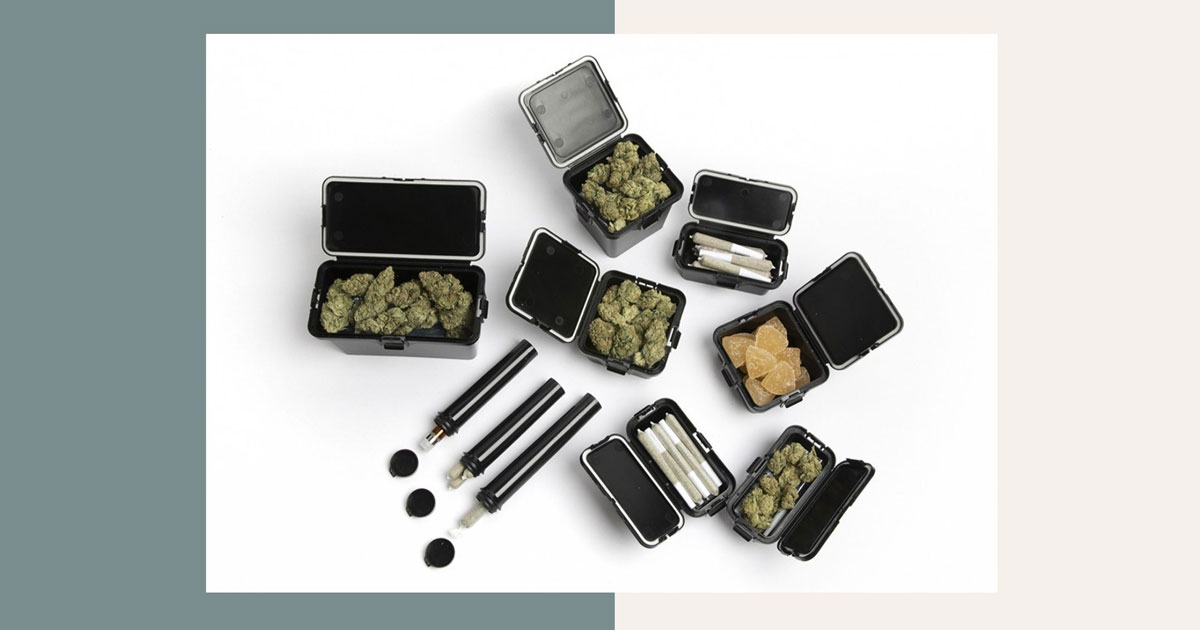
As the regulations for cannabis change in the US and allow for legal usage, more and more individually wrapped products are arriving at dispensaries across the country. Unfortunately, child-resistant packaging laws and a lack of packaging innovation have caused a dramatic increase in plastic waste in the cannabis industry. Both medicinal and recreational cannabis users risk accumulating these single-use plastics, and not all are recyclable.
Even if this excess plastic is recyclable, there is another barrier to recycling cannabis packaging: the size. Most city recycling programs are not capable of processing objects two inches in diameter or smaller. Unfortunately, this means that most cannabis packaging will be removed from the recyclable materials and transferred to waste headed for a landfill.
For these reasons, cannabis packaging recyclability and recycling rates are nearly 0% in the US. It is, however, important to note that these problems are not limited to the cannabis industry.
Resinate and Cannabis
Though Resinate was not founded to solve the specific issue of low recyclability in the cannabis industry, the company is now at the forefront of creating new systems for this industry. The movement was initiated when a founder, a medicinal cannabis user, began wondering what to do with his growing drawer full of empty cannabis containers. As a result, Resinate decided to create a new model that not only captured these small items in a thoughtful and strategic way to divert them from landfills but also improved on traditional models that contribute to pollution, global dysfunction, and waste.
Of course, the result of this innovation was the Energy Pod, which will collect any type of plastic cannabis packaging for recycling. Within the cannabis space, the SlingShot Program is safe, fun, and interactive for recyclers while also providing a compliant process for the dispensary operator. The process is meant to fill the gaps between individual and dispensary-wide recycling and provide a way for cannabis customers to recycle products that cannot be recycled at home.
Cannabis packaging plastics are compiled, then melted to create appealing color patterns that shine in several end products. These end products are designed to have a purpose for the cannabis user and are made from 100% recycled plastic. To date, Resinate has developed a versatile rolling tray in two color schemes, as well as a storage pot.
Cannabis Packaging Recycling FAQs
An innovative process like the SlingShot Program will naturally inspire quite a few questions. Here are the most common.
What Happens to Recyclable Materials That Are Too Small for the City’s Recycling System?
Even if you do the right thing and place your item in your home recycling bin, it is important to understand that your city may not have the infrastructure to recycle that item. If the material is less than two inches in size, it will slip through the cracks in the sorting system and end up in a landfill. Small recyclable materials should be placed in containers that support those items, like Resinate Energy Pods.
Are Recycling Programs Accessible for Cannabis Dispensaries?
Traditional recycling programs are not particularly accessible for cannabis dispensaries. Even if a dispensary elected to pay for a traditional recycling service, nearly all cannabis packaging would simply fall through the sorting system and make its way to the landfill. Though dispensaries in some states do have access to specialized recycling programs, they are usually limited to one type of material and are not diverted into long-term products. Resinate Energy Pods look to address this issue.
Suggested Reading: Cannabis Packaging and Recycling Issues
Does Recycling Actually Help the Environment?
According to the EPA, recycling conserves energy and natural resources while also preventing material from ending up in landfills. Recycling conserves energy by reducing the number of virgin materials required for product development. Virgin materials are harvested from natural resources and require energy to extract and process. If more products are formed from recycled materials, the demand for energy and natural resources decreases.
Resinate: For Forward Thinking Dispensaries
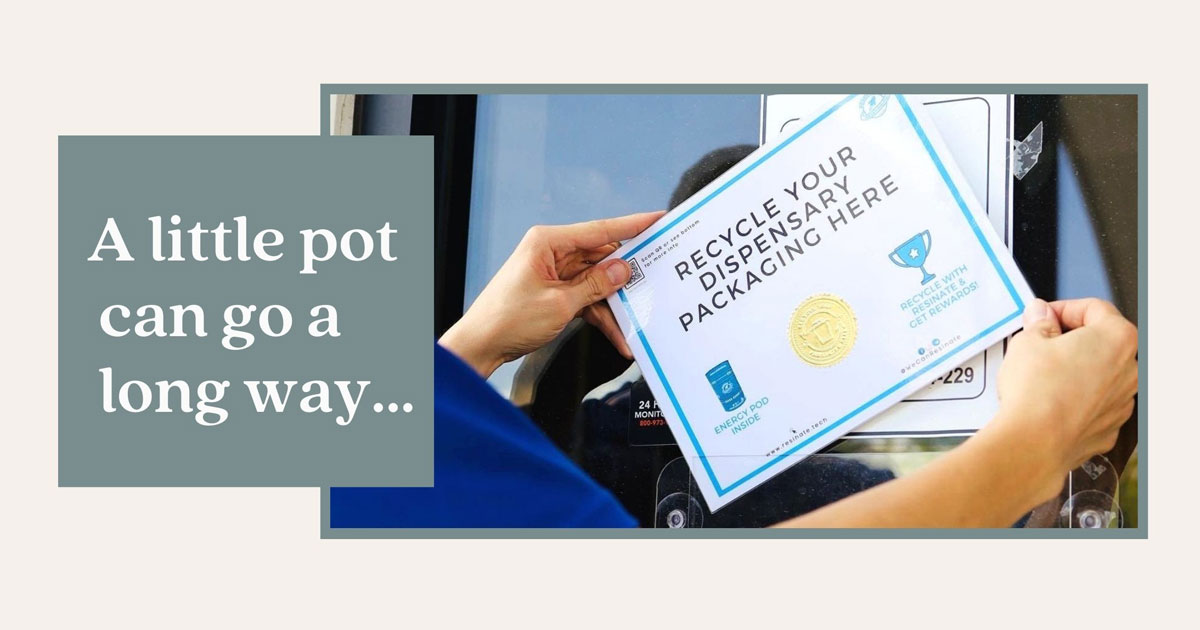
Though Resinate has created a recycling process that bridges a significant gap in small material recycling, the future of cannabis packaging sustainability will depend on the brands and operators within that industry. Retailers and wholesalers alike have an interest in being a part of the solution but must also protect their bottom line by minimizing expenses.
